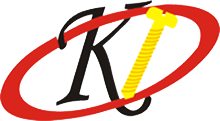
How to tighten a small nut has always been an enduring topic in mechanical design. Let’s talk about the most basic methods of fixing nuts in work, such as Japanese eccentric nuts, Tang nuts and Chinese self-tightening nuts. But today we will not talk about these stars in the fastener industry. Let’s talk about the most basic method of fixing nuts at work.
(1) Flat washer
A washer refers to a part which is cushioned between a connected member and a nut. Generally a flat metal ring is used to protect the surface of the connected member from being scratched by the nut, and to disperse the pressure of the nut on the connected member.
(2) Flat washer and spring washer
Spring washers are widely used in the bearing and non-bearing structures of general mechanical products. They are characterized by low cost and easy installation, and are suitable for parts with frequent assembly and disassembly. But the spring washer’s ability to prevent loosening is very low!
(3) Self-locking nut
The ordinary nut will loosen due to other reasons such as vibration during use. In order to prevent this phenomenon, a self-locking nut was invented. The function of self-locking nut is mainly to prevent loosening and vibration. For special occasions. Its working principle is generally self-locking by friction. Types of self-locking nuts classified by function are nylon-embedded, necked, and metal anti-loosening device. They are all effective torque type lock nuts. Due to its nature, self-locking nuts are difficult to screw.
(4) Nut lock fluid
Apply the nut anti-loosening liquid to the tightening place of the bolt, and then screw the nut on to achieve the effect of anti-loosening.
(5) Double nuts (left and right) to prevent loosening
It is also a good method to tighten and prevent loosening through the cooperation of a left-hand nut and a right-hand nut.
(6) Drilling and fixing of screws and nuts
In machinery, pins are mainly used for assembly positioning, and can also be used as overload, shear connection in connection, relaxation safety devices. The types of pins are: cylindrical pin, conical pin, perforated pin, split pin and safety pin.
